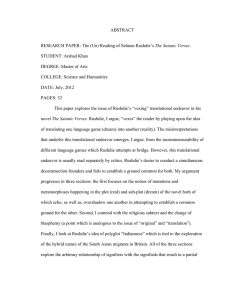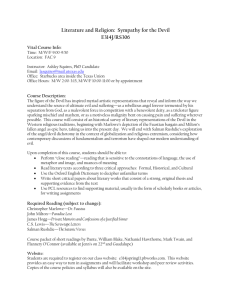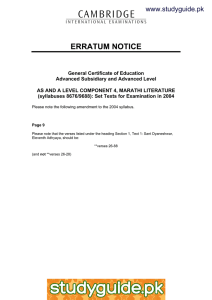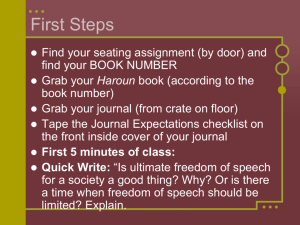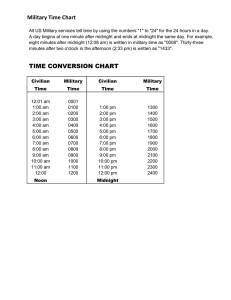E 349S Salman Rushdie
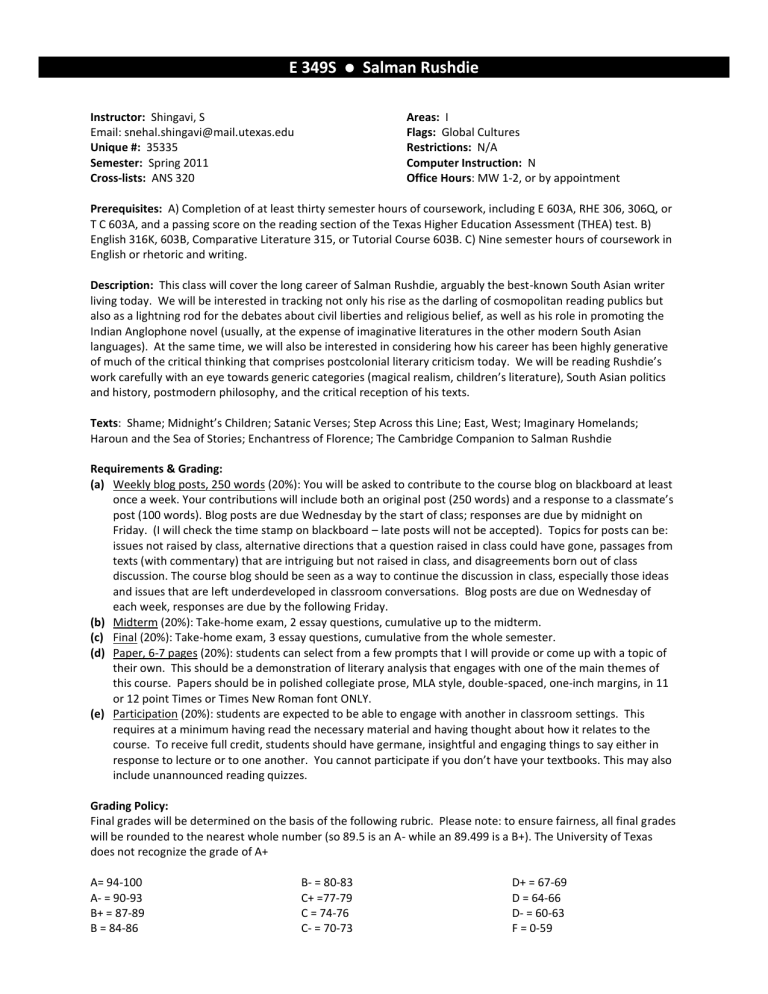
E 349S
Salman Rushdie
Instructor: Shingavi, S
Email: snehal.shingavi@mail.utexas.edu
Unique #: 35335
Semester: Spring 2011
Areas: I
Flags: Global Cultures
Restrictions: N/A
Computer Instruction: N
Cross-lists: ANS 320 Office Hours: MW 1-2, or by appointment
Prerequisites: A) Completion of at least thirty semester hours of coursework, including E 603A, RHE 306, 306Q, or
T C 603A, and a passing score on the reading section of the Texas Higher Education Assessment (THEA) test. B)
English 316K, 603B, Comparative Literature 315, or Tutorial Course 603B. C) Nine semester hours of coursework in
English or rhetoric and writing.
Description: This class will cover the long career of Salman Rushdie, arguably the best-known South Asian writer living today. We will be interested in tracking not only his rise as the darling of cosmopolitan reading publics but also as a lightning rod for the debates about civil liberties and religious belief, as well as his role in promoting the
Indian Anglophone novel (usually, at the expense of imaginative literatures in the other modern South Asian languages). At the same time, we will also be interested in considering how his career has been highly generative of much of the critical thinking that comprises postcolonial literary criticism today. We will be reading Rushdie’s work carefully with an eye towards generic categories (magical realism, children’s literature), South Asian politics and history, postmodern philosophy, and the critical reception of his texts.
Texts: Shame; Midnight’s Children; Satanic Verses; Step Across this Line; East, West; Imaginary Homelands;
Haroun and the Sea of Stories; Enchantress of Florence; The Cambridge Companion to Salman Rushdie
Requirements & Grading:
(a) Weekly blog posts, 250 words (20%): You will be asked to contribute to the course blog on blackboard at least once a week. Your contributions will include both an original post (250 words) and a response to a classmate’s post (100 words). Blog posts are due Wednesday by the start of class; responses are due by midnight on
Friday. (I will check the time stamp on blackboard – late posts will not be accepted). Topics for posts can be: issues not raised by class, alternative directions that a question raised in class could have gone, passages from texts (with commentary) that are intriguing but not raised in class, and disagreements born out of class discussion. The course blog should be seen as a way to continue the discussion in class, especially those ideas and issues that are left underdeveloped in classroom conversations. Blog posts are due on Wednesday of each week, responses are due by the following Friday.
(b) Midterm (20%): Take-home exam, 2 essay questions, cumulative up to the midterm.
(c) Final (20%): Take-home exam, 3 essay questions, cumulative from the whole semester.
(d) Paper, 6-7 pages (20%): students can select from a few prompts that I will provide or come up with a topic of their own. This should be a demonstration of literary analysis that engages with one of the main themes of this course. Papers should be in polished collegiate prose, MLA style, double-spaced, one-inch margins, in 11 or 12 point Times or Times New Roman font ONLY.
(e) Participation (20%): students are expected to be able to engage with another in classroom settings. This requires at a minimum having read the necessary material and having thought about how it relates to the course. To receive full credit, students should have germane, insightful and engaging things to say either in response to lecture or to one another. You cannot participate if you don’t have your textbooks. This may also include unannounced reading quizzes.
Grading Policy:
Final grades will be determined on the basis of the following rubric. Please note: to ensure fairness, all final grades will be rounded to the nearest whole number (so 89.5 is an A- while an 89.499 is a B+). The University of Texas does not recognize the grade of A+
A= 94-100
A- = 90-93
B+ = 87-89
B = 84-86
B- = 80-83
C+ =77-79
C = 74-76
C- = 70-73
D+ = 67-69
D = 64-66
D- = 60-63
F = 0-59
Schedule:
8/24 Introductions
8/26 Midnight’s Children
8/28 Midnight’s Children, Vijay Mishra, “Rushdie and Bollywood Cinema”
(Cambridge)
8/31 Midnight’s Children
9/2 Midnight’s Children
9/5
9/7
Labor Day
Midnight’s Children, Abdulrazak Gurnah, “Themes and Structures in
Midnight’s Children” (Cambridge)
9/9 Midnight’s Children
9/12 Midnight’s Children
9/14 Midnight’s Children
9/16 Shame
9/19 Shame, Brendon Nichols, “Reading ‘Pakistan’ in Salman Rushdie’s
Shame” (Cambridge)
9/21 Last Day to Drop Class Without Penalty; Shame
9/23 Shame
9/26 Shame, Amina Yaqin, “Family and Gender in Rushdie’s Writing”
(Cambridge)
9/28 Shame
9/30 Shame
10/3 Satanic Verses
10/5 Satanic Verses
10/7 Satanic Verses
10/10 Satanic Verses, Ruvani Ranasinha, “The Fatwa and its Aftermath”
(Cambridge)
10/12 Satanic Verses
10/14 Satanic Verses
10/17 Satanic Verses, Joel Kuorti, “The Satanic Verses” (Cambridge)
10/19 Satanic Verses
10/21 Satanic Verses; MIDTERMS DUE
10/24 Haroun and the Sea of Stories
10/26 Haroun and the Sea of Stories
10/28 Haroun and the Sea of Stories
10/31 East, West
11/2 East, West
11/4 East, West
11/7 The Enchantress of Florence
11/9 The Enchantress of Florence
11/11 The Enchantress of Florence
11/14 The Enchantress of Florence
11/16 The Enchantress of Florence
11/18 The Enchantress of Florence
11/21 Imaginary Homelands
11/23 Imaginary Homelands
11/24 Thanksgiving Holiday
11/25 Thanksgiving Holiday
11/28 Step Across This Line
11/30 Step Across This Line
12/2
12/12
Step Across This Line, FINAL PAPERS DUE
FINAL EXAMS DUE
Policies:
This course carries the Global Cultures flag. Global Cultures courses are designed to increase your familiarity with cultural groups outside the United States. You should therefore expect a substantial portion of your grade to come from assignments covering the practices, beliefs, and histories of at least one non-U.S. cultural group, past or present.
Documented Disability Statement: The University of Texas at Austin provides upon request appropriate academic accommodations for qualified students with disabilities. For more information, contact Services for Students with Disabilities at 471-6259 (voice) or
232-2937 (video phone), or visit http://www.utexas.edu/diversity/ddce/ssd.
Honor Code: The core values of The University of Texas at Austin are learning, discovery, freedom, leadership, individual opportunity, and responsibility. Each member of the university is expected to uphold these values through integrity, honesty, trust, fairness, and respect toward peers and community.
Academic Integrity: Any work submitted by a student in this course for academic credit will be the student's own work. For additional information on Academic Integrity, see http://deanofstudents.utexas.edu/sjs/acadint.php.
Religious Holy Days: By UT Austin policy, you must notify me of a pending absence at least fourteen days prior to the date of observance of a religious holy day. If you must miss a class, an examination, a work assignment, or a project in order to observe a religious holy day, I will give you an opportunity to complete the missed work within a reasonable time after the absence.
Other: Please turn off all electronic devices; if it can’t be on during takeoff in an airline, you cannot use it in my class. I will make exceptions for students using electronic versions of the textbooks and for people with special note taking habits, but I require that you email me your class notes immediately upon completion of the class.
Web Site: We will make regular use of the class’s blackboard site.
